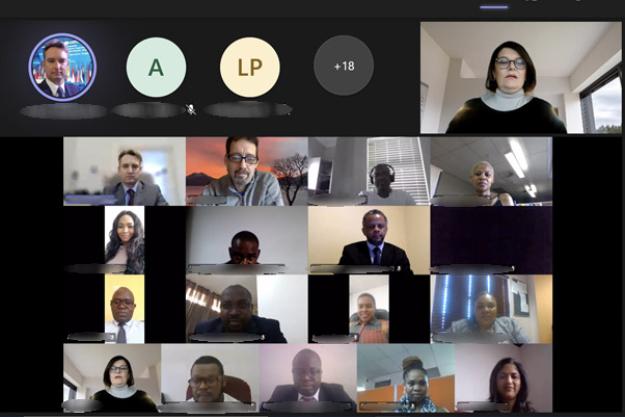
THE HAGUE, Netherlands–15 December 2021–The Organisation for the Prohibition of Chemical Weapons (OPCW) presented a new Online Self-Assessment Tool (OSAT) to Member States of the Southern African Development Community (SADC). The pilot project bolsters chemical safety and security at the regional and sub-regional levels, and is made possible with financial and technical support from the Government of the United Kingdom of Great Britain and Northern Ireland.
At the project planning and coordination meeting, the Acting Head of OPCW Assistance and Protection Branch remarked: “The launch of this project opens a new era of OPCW Technical Secretariat assistance which will help Member States assess chemical safety and security risks from hazardous chemicals, audit existing response capacities, and identify necessary improvement measures, including those that the OPCW could help build.”
Experts from the region and permanent missions to the OPCW vetted OSAT earlier this year in collaboration with the OPCW Technical Secretariat and national stakeholders from Botswana, Madagascar, Mozambique, South Africa, Tanzania, Zimbabwe, and Zambia. With a view to rolling out OSAT to all OPCW regions, the project scope and content was also reviewed by a number of OPCW partner training centres, and international experts from Argentina, Belarus, Brazil, Czech Republic, Malaysia, Netherlands, United Kingdom, and United States.
Over the next few months, interested SADC Member States, assisted by the Technical Secretariat, will conduct self-assessments and joint evaluations, and develop measures to improve national protective programmes. The outputs will be used by the OPCW Assistance and Protection Branch as the basis for programming in support of Member States in the SADC region.
The online meeting was attended by 24 representatives of OPCW National Authorities, national institutions, and Permanent Representations to the OPCW from ten Member States: Angola, Botswana, Lesotho, Madagascar, Malawi, Mauritius, Mozambique, South Africa, Zambia, and Zimbabwe.
Background
Since 2007, OPCW’s International Cooperation and Assistance Division (ICA), has managed the Programme to Strengthen Cooperation with Africa on the Chemical Weapons Convention — more commonly known as the Africa Programme. Now in its fifth phase, the Africa Programme assists participating Member States in achieving defined goals and proffering sustainable development for a peaceful and secure Africa. The Assistance and Protection Branch contributes to the efforts of Africa Programme with targeted projects falling under the remit of Article X, which focuses on assisting States Parties in strengthening national programmes for the development and improvement of a protective capacity against chemical weapons.
As the implementing body for the Chemical Weapons Convention, the OPCW, with its 193 Member States, oversees the global endeavour to permanently eliminate chemical weapons. Since the Convention’s entry into force in 1997, it has been the most successful disarmament treaty eliminating an entire class of weapon of mass destruction.
Over 98% of all declared chemical weapon stockpiles have been destroyed under OPCW verification. For its extensive efforts in eliminating chemical weapons, the OPCW received the 2013 Nobel Peace Prize.
